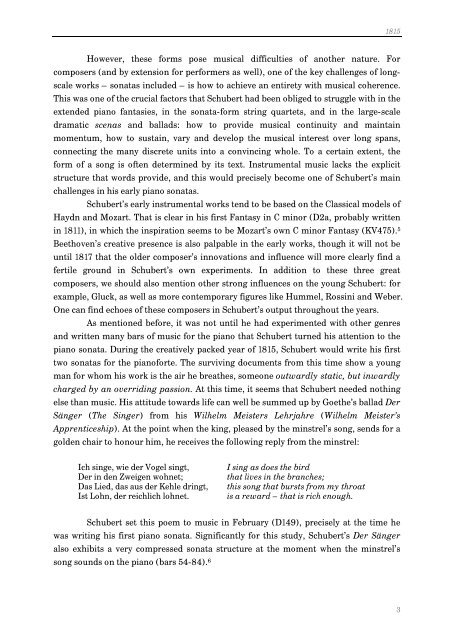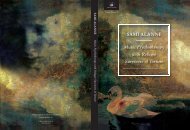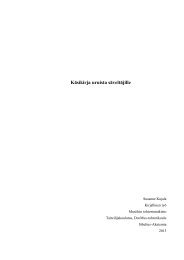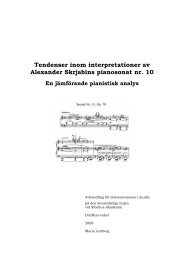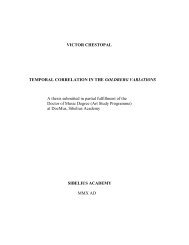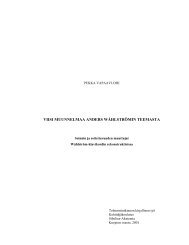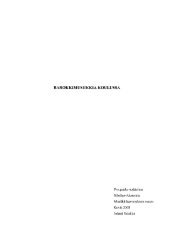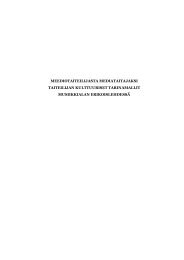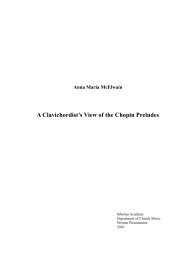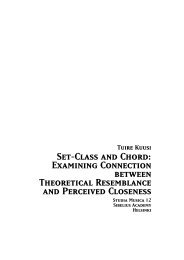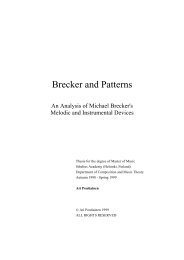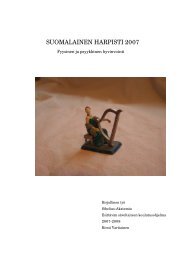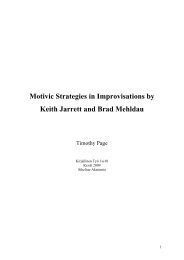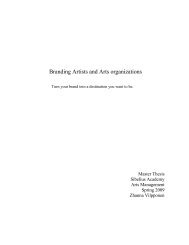The Unfinished Piano Sonatas of Franz Schubert Javier ... - Ethesis
The Unfinished Piano Sonatas of Franz Schubert Javier ... - Ethesis
The Unfinished Piano Sonatas of Franz Schubert Javier ... - Ethesis
You also want an ePaper? Increase the reach of your titles
YUMPU automatically turns print PDFs into web optimized ePapers that Google loves.
1815<br />
However, these forms pose musical difficulties <strong>of</strong> another nature. For<br />
composers (and by extension for performers as well), one <strong>of</strong> the key challenges <strong>of</strong> long-<br />
scale works – sonatas included – is how to achieve an entirety with musical coherence.<br />
This was one <strong>of</strong> the crucial factors that <strong>Schubert</strong> had been obliged to struggle with in the<br />
extended piano fantasies, in the sonata-form string quartets, and in the large-scale<br />
dramatic scenas and ballads: how to provide musical continuity and maintain<br />
momentum, how to sustain, vary and develop the musical interest over long spans,<br />
connecting the many discrete units into a convincing whole. To a certain extent, the<br />
form <strong>of</strong> a song is <strong>of</strong>ten determined by its text. Instrumental music lacks the explicit<br />
structure that words provide, and this would precisely become one <strong>of</strong> <strong>Schubert</strong>’s main<br />
challenges in his early piano sonatas.<br />
<strong>Schubert</strong>’s early instrumental works tend to be based on the Classical models <strong>of</strong><br />
Haydn and Mozart. That is clear in his first Fantasy in C minor (D2a, probably written<br />
in 1811), in which the inspiration seems to be Mozart’s own C minor Fantasy (KV475). 5<br />
Beethoven’s creative presence is also palpable in the early works, though it will not be<br />
until 1817 that the older composer’s innovations and influence will more clearly find a<br />
fertile ground in <strong>Schubert</strong>’s own experiments. In addition to these three great<br />
composers, we should also mention other strong influences on the young <strong>Schubert</strong>: for<br />
example, Gluck, as well as more contemporary figures like Hummel, Rossini and Weber.<br />
One can find echoes <strong>of</strong> these composers in <strong>Schubert</strong>’s output throughout the years.<br />
As mentioned before, it was not until he had experimented with other genres<br />
and written many bars <strong>of</strong> music for the piano that <strong>Schubert</strong> turned his attention to the<br />
piano sonata. During the creatively packed year <strong>of</strong> 1815, <strong>Schubert</strong> would write his first<br />
two sonatas for the pian<strong>of</strong>orte. <strong>The</strong> surviving documents from this time show a young<br />
man for whom his work is the air he breathes, someone outwardly static, but inwardly<br />
charged by an overriding passion. At this time, it seems that <strong>Schubert</strong> needed nothing<br />
else than music. His attitude towards life can well be summed up by Goethe’s ballad Der<br />
Sänger (<strong>The</strong> Singer) from his Wilhelm Meisters Lehrjahre (Wilhelm Meister’s<br />
Apprenticeship). At the point when the king, pleased by the minstrel’s song, sends for a<br />
golden chair to honour him, he receives the following reply from the minstrel:<br />
Ich singe, wie der Vogel singt,<br />
Der in den Zweigen wohnet;<br />
Das Lied, das aus der Kehle dringt,<br />
Ist Lohn, der reichlich lohnet.<br />
I sing as does the bird<br />
that lives in the branches;<br />
this song that bursts from my throat<br />
is a reward – that is rich enough.<br />
<strong>Schubert</strong> set this poem to music in February (D149), precisely at the time he<br />
was writing his first piano sonata. Significantly for this study, <strong>Schubert</strong>’s Der Sänger<br />
also exhibits a very compressed sonata structure at the moment when the minstrel’s<br />
song sounds on the piano (bars 54-84). 6<br />
3


